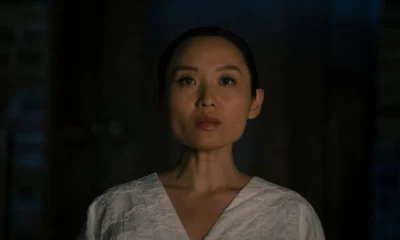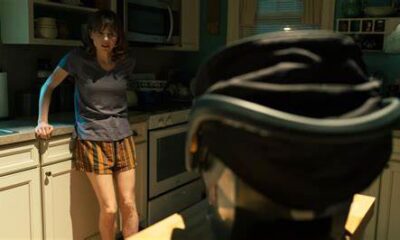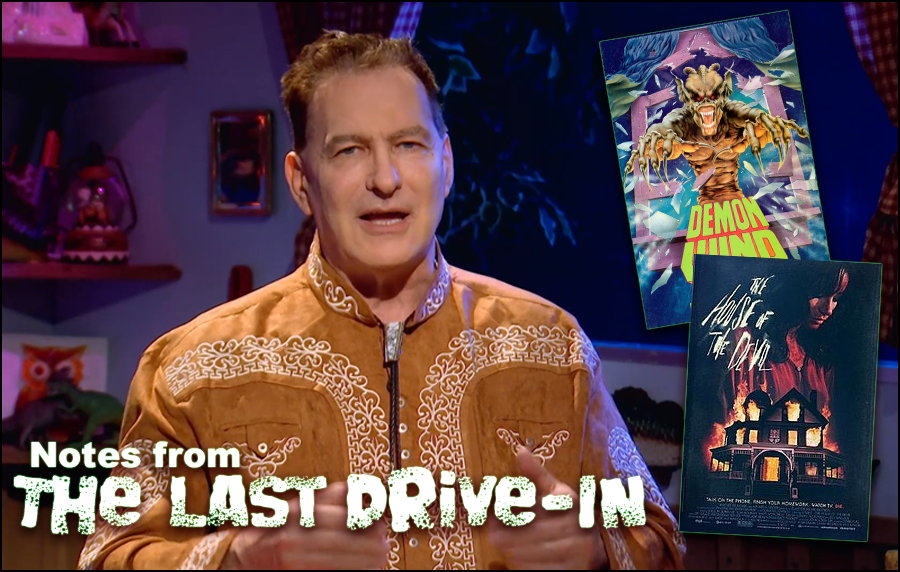
Notes from The Last Drive-In: S1E5
Tonight’s theme is demons… and the people who love them… and who run from them, too.
We’re back with Joe Bob again this week at The Last Drive-In, exclusively on Shudder. It’s important to note, Mutants, that as of this moment Shudder has not committed to renewing The Last Drive-In for another round, so what I ask is that you take a moment to tweet @shudder with your desire for more episodes. Don’t forget the hashtag #TheLastDriveIn either!
And before we dive in to the Drive-In, I figure I’d toot my own horn again from the livestream.
Demon Wind (1990)
Opening Rant: That old idea of “this will hurt me more than it will hurt you.”
The first film of the night was that kind of drive-in cheese that is a perfect fit for us mutants. Demon Wind (1990) is a knockoff of The Evil Dead that is probably most interesting for the un-credited appearance of Lou Diamond Phillips as a zombie. Well, the Kung Fu magician is a nice touch as well.
The film follows a young man named Cory and his group of friends as they visit a farm that was owned by Cory’s family and has seen several bizarre and tragic deaths. After being attacked by demons, the group is forced to take shelter in the old farm and survive a night of terror, possessions, and surprisingly little demonic wind.
Demon Wind was directed by Charles Philip Moore and was only one of four films in his career. The movie features a group of very bland actors and actresses who look like knock-off versions of far more famous folks. The sole exception here being Stephen Quadros, the show-stealing Kung Fu magician. Other performances include Eric Larson, Francine Lapensée, Rufus Norris, and Jack Forcinito.
Reviews
Joe Bob offered the film a generous 3 stars. The first half of the night’s highlight comes from Joe Bob attempting to summarize the 4 generations-worth of plot that Demon Wind eventually, inscrutably manages to work in. As always though, the insights into the filming were particularly entertaining, such as the revelation of the crew using the short ends of film stock, and using available fog for the foggy sequences of the movie as there was no budget for a fog machine. Wow.
As for the Haunted MTL review of the film, Demon Wind is strictly a 2 and a half star affair. It becomes a lot more fun when you pretend it is a spin-off of The Evil Dead with some doomed idiots and the random badassery of the Kung Fu magician. Also… those were some of the most Deadite-esque demon zombies outside of the Ash Williams adventures.
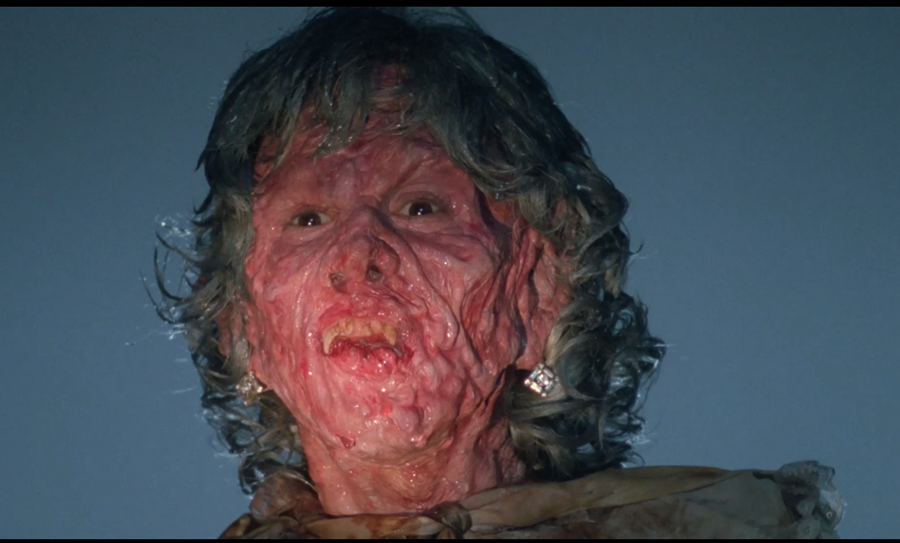
Best Line: “You killed me.” (Spoken like a disappointed mother)
The House of the Devil (2009)
Opening Rant: The theological origins of the concept of Hell.
The second film of the night was Ti West’s 2009 throwback Satanic cult film The House of the Devil. Ti West is a bit of a divisive figure in horror, sure, but no matter where you land on his work, The House of the Devil is certainly a much better film than Demon Wind… though maybe not as a drive-in movie. More on that later.
The House of the Devil follows a young babysitter named Samantha who, in desperate need of money to escape her awful roommate and pay for her own apartment, takes on a babysitting job. When she arrives at the house, however, she discovers that the job was not quite what was advertised. Regardless, she takes the job and spends a terrifying night seemingly alone in a spooky house, unaware of the sinister events she will become embroiled in.
The movie was written, edited, and directed by Ti West. It stars the magnetic Jocelin Donahue as Samantha, with Tom Noonan and Mary Woronov. Greta Gerwig has a brief, but memorable role, and there is a dash of Dee Wallace to add a little more flavor to this throwback film.
The House of the Devil, for someone who is unaware of its throwback nature, would likely see the film as a product of the late 70s early 80s, which the film purposefully evokes. Everything from the cameras used, the quality of the film, to the title card and lighting make this a film that really captures the grimy aesthetic of the late 70s to 80s slasher aesthetic.
Reviews
Joe Bob awarded The House of the Devil 3 and a half stars. Joe Bob’s praise of the quality of the film and the sound design was effusive. In particular, there was a great deal of praise pointed at Jeff Grace’s score of the film, particularly how the score punctuates the noises of the house that terrify poor Samantha. Joe Bob did spend a great deal of time discussing Ti West as a filmmaker and horror audience reactions to the kind of “slow horror” that he tends to focus on in his work. At one point, Joe Bob describes Ti West as an “obsessive-compulsive only child” in a way that can only be described as endearing.
We’ll get this out of the way now: I am a fan of Ti West and The House of the Devil is a 4 star film. It is important to note that the film is slower that most films on The Last Drive-In, and unfortunately it makes the Mutants a little cranky. It is very interesting to watch these films live and watch Mutants discuss it on Twitter. Much like week 3 when The Changeling was on, many fans seemed to complain about The House of the Devil being slow. The Changeling and The House of the Devil are amazing movies and worth watching, but… they are not necessarily drive-in sort of films that live up to the three Bs (Blood, Breasts, and Beasts).
Despite these films not being the kind of films expected for drive-in fare, I appreciate and value their presence in The Last Drive-In, though and hope we get more of these slow-burn creepers as they are personal favorites of mine.
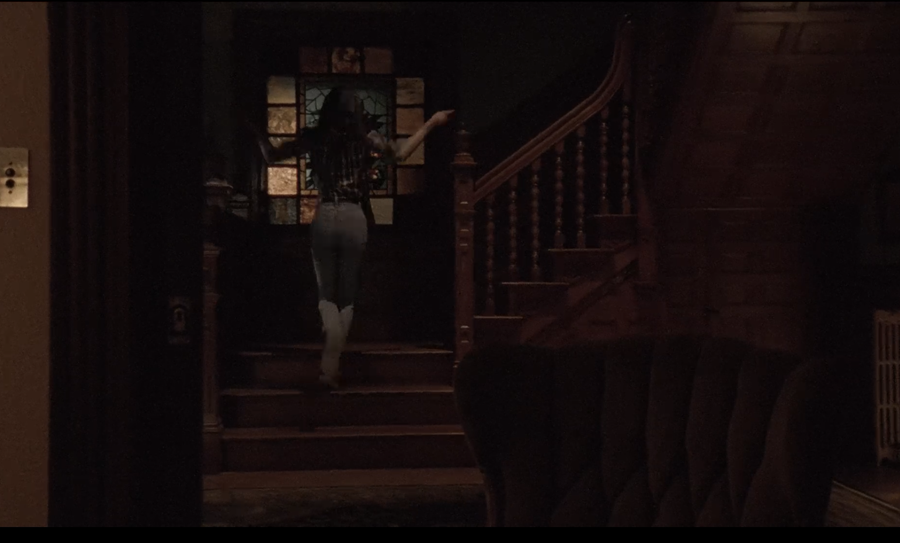
Best Line: “I heard you college kids love pizza.”
Drive-In Totals
- 1 tan suede shirt with white trim, with a silvery triangular bolo tie
- 1 creepy gas station in the literal middle of nowhere
- 1 rotten egg
- 2 ceremonial daggers
- 2 Joe Bob jokes (the British vs. the French, and handjobs)
- 2 Joe Bob clipboard sightings
- 3 warnings to “not go up there”
- 4 generations worth of plot
- 5 Twitter bans for Darcy
- 9 bland, identical teenage archetypes
- 18 day shoot for The House of the Devil
- Gratuitous 90s sexism and homophobia
- Gratuitous gun-totin’ old man
- Gratuitous hallucinatory she-demon titties
- Gratuitous home inspection
Gratuitous@jocelindonahue dancing- Gratuitous blood slip and slide
- Gratuitous Darcy cosplay (as Samantha)
- Beer Can Fu
- Exploding Doll Fu
- Tongue Lash Fu
- Joe Bob Plot Summary Fu
- Surprise Lou Diamond Phillips Fu
- Vase Smashing Fu
As always, please share your thoughts with us about The Last Drive-In. Also, please check out our other great content here at Haunted MTL.
Movies n TV
Wheel of Time A Question of Crimson Is a Political Espionage Delight
Episode two of Wheel of Time felt like the beginning of a long journey. Stories are unfolding, lives are changing, and blood is spilling.
Let’s discuss.
The story
We begin this episode in the past with Elayne’s mother, Queen Morgase. It turns out her rise to the throne was a bit, shall we say, cutthroat. So when she shows up at the White Tower, Siuan is concerned.
She might have reason to be, too.
Meanwhile, Rand, Egwene, Moiraine, Lan and Aviendha are in the Spine of The World. As they travel through some of the most breathtaking lands I have ever seen on a TV show, Egwene is plagued with nightmares. We think at first that’s just her trauma working itself through her system. But we soon find out that it might not be that straightforward.
Finally, Perrin returns home to heal after his hand is almost cut in half. But when he gets there he finds the town has been infested by Children of The Light. And they’re looking for him.
What worked
There was something heartwarming in this episode about political espionage and choking religious persecution. And that is Elayne’s relationship with her family.
I have consumed a lot of fantasy content with royal families. And I have never once heard a princess call her mother ‘Mum’. I’ve never seen royal siblings get along. And I have sure as hell never seen a princess have a good relationship with her step-parent.
This was refreshing. Even though Queen Morgase is kind of a horrible person she seems like a good mother. And that’s an unexpected delight.

Of course, this is just one storyline among many. And while this can sometimes be overwhelming, in this case it wasn’t.
I’ll be honest, some of these storylines are going to drag for me. I know this because I’ve read some of the Wheel of Time books and I have an idea that not all the characters exactly pique my interest.
No one likes all the characters. No one likes all the storylines. While I am here for the political espionage between Queen Morgase and Siuan, not everyone likes it. While others might be fascinated with Selene trying to win Rand back, I couldn’t care less.
Having multiple storylines keeps everyone’s attention better. So long as things don’t get out of hand. Things can easily get out of hand. But this seems to be managed well.
So far.
What didn’t work
As I mentioned above, I’m not thrilled with Rand’s story at this point. And while it’s fine to not like a storyline when there are this many to choose from, it’s not fantastic that the one I like the least is the one involving our two main characters. And anytime we were with the team at the Spine of The World, the only thing that brought me joy was Moirain’s hat. It reminded me of Stockard Channing’s hat in Practical Magic.
The problem is that Rand is Charlie Brown with controversial magical powers. He is boring, serious, and pessimistic.
And yes, I understand that he has a heavy emotional burden and he’s the Dragon Reborn and that’s quite taxing and all. But let’s be fair, there isn’t a single person in this show that doesn’t have a heavy burden. And most of them manage to be fun occasionally.

All that being said, this episode of Wheel of Time did exactly what it needed to do. It set up conflicts at each of the three locations. It established emotional ties between the characters and the events. And it established goals for everyone.
This was, in short, a solid episode. Not groundbreaking, not mind-blowing or life changing. It was simply good. It was entertaining and moved the plot forward.
Well done.
 (3.5 / 5)
(3.5 / 5)
Movies n TV
Wheel of Time Returns With A Bang
Wheel of Time is back for season three. There are mixed feelings regarding this. Last season, there were some serious pacing issues. And some serious sticking to the book’s storyline issues. But we’re two seasons in, and we don’t give up so easily. So let’s dive into episode one, To Race the Shadow.
By the way, I highly recommend watching this episode with the subtitles on. You’ll see why.
The story
We begin this episode with Liandrin facing a trial of sorts for her rampant betrayal. She does her best to gaslight her Aes Sedai sisters into thinking that Siuan Sanche is the real traitor.

When that doesn’t work, she reveals how many Black Aes Sedai have actually infiltrated the tower.
Spoiler, it’s a lot.
In the aftermath, our whole team gathers to drink and enjoy one night of relaxation before they head out to the Tear to form an army for Rand. All is going well until they’re attacked by myriad creatures and a sentient axe.
What worked
This episode was long. It had a run time of an hour and eleven minutes. And a lot of that run time was spent in heavy dialog scenes.
Fortunately, these were well-done scenes.
If you’re going to have a lot of talking scenes, there are good ways and bad ways to do it. Last season, we saw lots of examples of the bad way to do it. But this episode did it well. For one thing, other things were going on while conversations were taking place. The characters are drinking, playing games, walking through an interesting city. And the scenes themselves didn’t stretch out. They weren’t repetitive. We heard what the character had to say, then we moved on.
It was also nice that the point of these scenes wasn’t just info dumps. We had character development. We had romantic interactions. We had plot development and foreshadowing.
Overall, this episode felt like what it was. A moment of calm before a storm.
Taking a step back, I’d be remiss if I didn’t address the fight scene at the start of the episode. Because it was epic.
The magic looked amazing. The martial arts that went along with it looked fantastic. The costumes were beautiful. It was just incredibly fun to watch.
More than that, it was emotional. We lost some characters in that fight that were important. And it was clearly emotionally shattering for many of our characters, who found themselves betrayed by people they trusted.
So many of them.
It was a great way to open the season.
What didn’t work
Despite that, this episode wasn’t without its flaws.
First off, there were a lot of dialog scenes. And they were good scenes, as I’ve already discussed. But it was one after another after another. And when your episode is, again, an hour and eleven minutes, it’s maybe a little much to have so much chit-chat. Couldn’t some of these conversations, important as they were, have been moved to maybe another episode?
Finally, I want to talk about Egwene’s travel through the arches.

I feel like maybe there were some deleted scenes here. Because there must have been more to that visit than what we saw, right?
We could have seen Egwene battle Rand. That would have been badass and emotionally devastating. We could have seen her with a quiet life with Rand back home at the Two Rivers. We could have seen anything except for the quick clip of Rand in a bloody river, followed by Egwene being shoved back out in a bloody shift.
No products found.
Bad job. But at least it wasn’t an extended scene of Moiraine collecting bathwater, and then taking a bath while looking sad. If we’d started this season with another scene like that, it might have broken my brain.
Amazon dropped the first three episodes at once. So we’ll be back soon to talk about episode two. See you then.
 (4 / 5)
(4 / 5)
Movies n TV
Entertaining as hell: Eight Legged Freaks (2002) Review
Early 2000s is a special era for the industry. It accepts the cheesiness and corniness of movie making, in turn producing some gems in their own right. Eight Legged Freaks starring David Arquette and young Scarlet Johanson is a horror comedy about giant spiders who overtake a small town. As crazy as that premise sounds, the movie surprisingly has a ton of heart and is super entertaining. Let’s review, shall we?
Plot
We start Eight Legged Freaks with a shot of toxic waste spilling into the water supply of Joshua, a spider farm owner. He is friends with Mike, one of our protagonists, who is a science geek and a spider enthusiast. Mike notices something quite right upon visiting Joshua, but no one takes him seriously. We are then introduced to the rest of the crew. Mike’s mother Samantha, the town sheriff, is too busy chasing Ashley, his sister, who is dating the town mayor’s son Bret (something Samantha does not approve of). We also have Chris, who returns to the town to save his father’s legacy in the town mines. He has opposition from Wade, Bret’s father, who wants to use the mines for his business ventures. Lots of drama going on that will only get juicier once the spiders get loose.
The creepy crawlies quickly dispose of Joshua and make their grand appearance after Ashley rejects Bret’s advances, abandoning him in the middle of a desert. A glorious chase sequence ensues as the spiders make their way towards the town, wreaking havoc on its residents. In a true horror fashion (which the movie acknowledges), it takes some convincing from Mike and then from Samantha for the town to take the threat seriously. The tongue-in-cheek style of narrative adds the comedy aspect to a movie that would otherwise burn out fairly quickly.
The remaining characters hide out in a shopping mall as it’s the only somewhat sturdy building in the area. This doesn’t last long as the spiders break in, forcing them to run through the mines. Their resources to fight the creepy crawlies off are limited as the methane gas doesn’t allow them to use firearms. Such conditions require resourceful thinking from Chris, who uses perfume to fend off the leader of the spider group and save himself during the climax of the movie.
Character dynamics are not forgotten once the action kicks in. We have Chris confessing his long-term feelings for Samantha which she knew all along, which provided some comedic relief. Bret also reunites with Ashley and apologises for being an asshole. Mike finally gets the appreciation he deserves as his knowledge saves the townsfolk more than once during the whole ordeal.
We end the movie with the town’s radio show person telling the story as an urban legend during his segment. This brings it into question – how much of it happened the way he said it did? We can only guess…
Overall thoughts
Eight Legged Freaks is a fun creature feature with some self-aware commentary on genre tropes that doesn’t take itself too seriously. The acting is good, the pacing fitting and the characters are likeable enough for you to want them to make it through. Definitely a must watch, if you don’t suffer from arachnophobia, that is.
 (5 / 5)
(5 / 5)
- What do you get when you cross toxic waste with a bunch of exotic spiders? Eaten! The townies of Prosperity, Arizona will all become a screaming smorgasbord if mutated arachnids as big as SUVs have their way in this comedy/horror crowd pleaser whose creators include the producers of Independence Day and Godzilla
- Spiders that leap like gazelles, web-spitting spiders, spiders that suck your insides out as if through a straw—they’re all among the behemoths conjured up by an inventive effects team
- David Arquette (Scream) leads the two-legged stars, mobilizing the citizenry in a last-ditch fight to survive
Last update on 2025-03-10 / Affiliate links / Images from Amazon Product Advertising API








